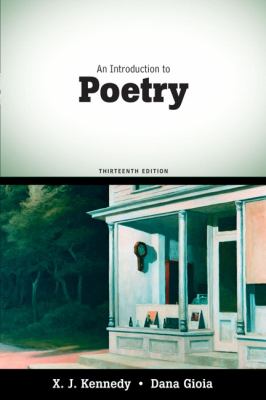Are there any early memories of being interested in writing?
I do feel as if I have been writing for a very long time now. I’m 44 now. I wasn’t super young, not three years old or anything like that, but when I was around 10 or 11 I was certainly writing a little. I was always pretty wordy. I was an only child and I didn’t have anyone to impress other than the adults around me. So I could be a precocious little chatterbox.
We had a lot of books in the house and one of them was my father’s old poetry textbook, X J Kennedy’s “An Introduction to Poetry”, which had, as books often do which come into your life when you are very young, a talismanic effect on me. That book explained a lot about the craft of poetry.
There wasn’t any “a-ha” moment, but I have always been language-focused, so I can say that I never anticipated ever doing anything else other than something to do with writing, whether that might be literature or history or something like that. So in a sense there was always a connection to writing.

What about support at home or at school?
I was writing in multiple big, spiral-bound notebooks when I was 13 or 14. I was always trying to come up with poems and stories, maybe three clever little poems a day, that sort of thing.
I was definitely supported in school. I certainly had individual teachers who encouraged me. I have a lot of good things to say about my schooling because I think we had pretty long reading lists and we were encouraged to really dive into literature and do close readings of novels and poetry. I get the feeling we did more of that than students do now.
I grew up in New Jersey, and in the state of New Jersey there was this great programme called the Governor’s School of the Arts where they would take 10 students from various disciplines: musicians, dancers, actors, visual artists and writers each year. Everyone went to a sort of boarding school summer camp on a university campus where you would have a four-week intensive training course. You had to apply for that, which I did. I got in.
When you’re young, it is a very uplifting thing to have institutions think you are good at something. We were taught by writers who had real reputations. Now that programme doesn’t exist any longer, which is terribly sad. It was such a gift, looking back on it.

Do you go on to college or university?
I went to university, and then grad school after that. I went to Rutgers, which is the state university of New Jersey. When you do a degree like mine (I was an English and history double major) it really is committed to lots of writing.
I think, maybe, I had some idea that I would end up in academia, and I think there was an idea that I would write poetry and provide incisive commentary on literature. I worked with some wonderful people, like William Dowling, Colin Jager, Marcia Ian and Jonah Siegel. And then I ended up at Princeton to do a PhD in English (which I didn’t finish), and I worked with wonderful people there as well: Jim Richardson, Jeff Dolven, Susan Stewart and others. People who were greater scholars than I could ever be!
In the end I really wasn’t a great fit for academia. I don’t think that was the way I wanted to interact with literature for the rest of my life. That situation where you are writing material which a tiny number of people might read. That your work would, at best, be aimed at a few dozen institutions and little beyond that. That seemed to me like a limited way of being connected with literature. I would probably have felt differently if I was good at it, though.
What do you do then?
I went into publishing, and yes, it is an industry with its own set of issues, but at the very least books were being produced for actual readers and there was a public element to it. I was much happier in that environment. I also think I’m good at it.
Are you writing your own work at this point in time?
I was always trying to work on material, but I hadn’t, at that point, in the late 2000s and early 2010s, developed a voice that was my own. I really had to keep working on my own writing because when I look back on unpublished material, I can see it just wasn’t quite right. Too much of the material was derivative.
How do you shift towards your own voice?
I continued to read a lot. I had always done that. Becoming an editor, I think that helped me develop my writing. I would argue that editing is so valuable in terms of helping develop your own writing, because you can see your mistakes in the mistakes other people are making.
I was writing a lot of poems, and I won’t be the only person to say to you that you have to write lots and lots of bad poems before you actually start writing good poems.
I was also starting, in the mid-2010s, to do a lot of reading at gigs, and I think that allowed me to figure out what was working and what wasn’t.
How did that help?
If you ask someone to read your work you get one person’s opinion, and in a reading group you might get four people’s opinions, but if you are performing your work in front of 40 or 50 people you get a hivemind feeling regarding the poem. That audience feedback is invaluable.
Beyond that, performing a lot, reading your own work to people, builds your confidence as you slowly work out what is connecting and what isn’t and what it is that you want to say. You are constantly refining your work on the page and in your mind, and from there back to the page, and eventually to the performance or the reading. You also meet lots of lovely people going to events and gigs, which adds to the experience as well.
So, writing a lot, reading continually and performing my work. Those were the big shifts in my situation regarding the production of my own poetry.
If you would like to follow up on Erik Kennedy’s work see the links below
